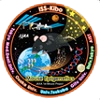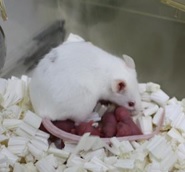This is an archive of information released in the past.
Disclaimer: It may contain broken links or outdated information. Some parts may not function in current web browsers.
*Visit https://humans-in-space.jaxa.jp/en/ for the latest information.

Experiment
- News
- Kibo Utilization Strategy
- Kibo Utilization Plan
- List of JAXA's Utilization Themes
- Experiment Facilities
- Space Environment Utilization
- Archive
World's first survival return of all mice reared for a long time in ISS Kibo and the birth of next-generation mice

JAXA
University of Tsukuba
Osaka University
【Points】
- A small animal rearing mission conducted in the Kibo module successfully completed the simultaneous rearing of mice under artificial (1G) and microgravity (0G) environments, and the return of all mice to Earth in a live condition. This marked the first time ever that mice were simultaneously reared at different gravity levels, and that all the mice survived upon their return.
- Mice returned from space gave birth to their offspring.
【Overview】
The Japan Aerospace Exploration Agency (JAXA), University of Tsukuba, and Osaka University are pleased to announce the successful completion of rearing mice for 35 days using the Cell Biology Experiment Facility (CBEF) with an exclusive centrifuge function in the Japanese Experiment Module ("Kibo") of the International Space Station (ISS).
This long-term rearing featured simultaneous rearing under an artificial gravity environment (1G) in orbit and under a microgravity environment (0G) by using Japan's unique experimental device featuring a centrifuge function to only study the effects of gravity. After 35 days of observation under both gravity levels, all mice were successfully returned alive.
The twelve male mice were launched from Florida on July 19 (JST), and returned to Earth in good health on August 27. Later, in collaboration between the University of Tsukuba and Osaka University, the offspring pup mice fathered by space mice reared in the 1G and 0G environments were born on September 28.
【Importance of long-term rearing】
Due to a long-term stay in space, the bodies of onboard astronauts are adapted to a gravity-free environment and show a declining vestibular function (decrease in the sense of balance), a shift in fluids (with excess body fluids shifting to the upper body), atrophy of lower-limb muscles, and bone loss, all of which are symptoms similar to those seen among elderly, bedridden people.
Many researchers struggle to elucidate the causes of declining physical functions of the elderly due to being bedridden, but such causes have yet to be clarified. Given the success of this rearing experiment, research may be conducted from a novel viewpoint for the first time ever, and such an approach may lead to discovering new drugs that will suppress the decline of such functions.
The accumulation of such fundamental knowledge will also become a foothold for mankind in distant space in the future, such as how children can inherit the effects of a long-stay in space from their parents.
While working for the birth of offspring mice, we completed a primary evaluation of the changes in the bodies of parent mice that stayed in space. Symptoms similar to those of the physical deterioration of the elderly, such as the attenuation of leg muscles, accumulation of fat, changes in liver tissue, and especially symptoms of sarcopenia were observed in space-cultured mice. We plan to conduct detailed analysis on the gene levels of mice that stayed in space, so as to provide a trigger for taking measures for Japan's rapidly aging society.
Regarding the rearing of the mice, such as feeding them and replenishing drinking water, the onboard astronauts, Flight Control Team on the ground, mice health management team (including a veterinarian), and the experimental equipment development team worked together around the clock to monitor the health of the mice and status of the equipment, in order to safely return all the mice to Earth.
※ Onboard Mouse cage
0G
1G
[Both movies taken on July 25, 2016. Credit: JAXA]
※ Baby mouse of a space mouse

[Photo taken on September 28, 2016.
Credit: JAXA/University of Tsukuba/Osaka University]
The baby is being cared for by a mouse of a different
species who is good at parenting.
*All times are Japan Standard Time (JST)
| Copyright 2007 Japan Aerospace Exploration Agency | Site Policy |
